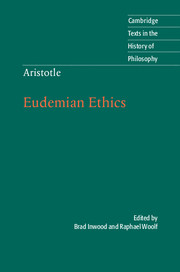Book VI
Published online by Cambridge University Press: 05 February 2013
Summary
vi.1.1 Next we must make a fresh start and say that when it comes to character states there are three kinds to be avoided: vice, lack of self-control and brutishness. For two of them the opposite is obvious; one of them is called virtue and the other is called self-control. But when it comes to the opposite of brutishness it would be most fitting to call it superhuman virtue, a kind of heroic and divine virtue – as Homer portrays Priam saying about Hector that he was exceptionally good ‘and he did not seem to be a child of mortal man but rather of a god’. vi.1.2 So if, as people say, humans can become gods through an excess of virtue then the state which is the counterpart to brutishness would clearly be of this sort. For just as a brute beast has neither virtue nor vice so too a god has neither. The condition of a god is something more honourable than virtue and the other is a different kind of vice. vi.1.3 Since the occurrence of a ‘godlike’ man is rare – this is the term customarily used by the Spartans when they admire some man intensely; they say he is a ‘gawdlike’ man – in the same way a brutish man is also rare among human beings. It happens most often among barbarians but some cases also occur as a result of disease and deformity. We also use this word as a term of abuse for those humans who are excessively vicious.
vi.1.4 But we should discuss this sort of disposition later; we have already discussed vice. We need to discuss lack of self-control and softness and indulgence, as well as self-control and toughness. We shouldn’t suppose that each of these is concerned with the same states as virtue and wickedness, nor that they are a different kind altogether. vi.1.5 As in the other cases, we must set down what appears to be the case and, after first puzzling through those appearances, we must display all the reputable beliefs about these conditions, or if not all then most of them and the most important ones. We will have done a sufficient job at this if the difficulties are dissolved and the reputable beliefs remain.
- Type
- Chapter
- Information
- Aristotle: Eudemian Ethics , pp. 97 - 120Publisher: Cambridge University PressPrint publication year: 2012

